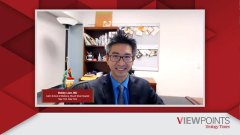
Evolution of Care of mCSPC
Vivek K. Narayan, MD, MS, provides insight on the evolution of care for mCSPC and the current use of ARI-directed therapy for disease management.
Episodes in this series

Neal Shore, MD, FACS: Let’s move to the remarkably exciting area of advanced prostate cancer. You can define advanced prostate cancer in many ways, but for our discussion, let me give this back to you, Vivek. Isn’t it interesting to think about mCSPC [metastatic castration-sensitive prostate cancer]? Essentially, monotherapy ADT [androgen deprivation therapy] was the standard until the last few years, starting with CHAARTED. But today we can talk about the role for docetaxel. It clearly has a role—generic, inexpensive, accessible—but give us an overview before we get into the trials that lead to the level 1 evidence. Why monotherapy ADT for anyone with mCSPC? Help the audience understand the difference between de novo vs recurrent, low volume vs high volume, and why combination therapy is the standard of care.
Vivek K. Narayan, MD, MS: I echo what you were saying. This conversation with patients with a new diagnosis of metastatic prostate cancer would have been relatively straightforward even 5 or 6 years ago. But we’re thinking about many things when we meet with that person for the first time. In a nutshell, we know that obviously, systemic androgen deprivation therapy is associated with very robust responses for the majority of men with metastatic prostate cancer, but we also know that there’s a time span on that.
Invariably, the development of biologic castration resistance will happen in most men with metastatic disease on ADT. We knew that we have all these life-prolonging therapies in the castration-resistant setting, such as docetaxel chemotherapy and a variety of AR [androgen receptor]–signaling inhibitors, that offered meaningful survival improvements in the resistance setting. Of course, the question became, could we target those resistant clones earlier in the disease course, and potentially offer more bang for the buck in terms of clinical outcomes in the long term?
I’ll briefly mention the CHAARTED study, which was the first in 2015 to show that survival benefit. We later saw benefits with abiraterone from a multitude of randomized studies, but today we’re focusing on 2 AR inhibitors, enzalutamide and apalutamide, which have shown significant benefit—level 1 evidence in randomized clinical trials in this metastatic castration-sensitive setting. There are a lot of nuances and a lot of factors that we’ll get into. But 1 that you alluded to was the burden of metastatic disease. This has been defined variably across different studies. At this point, most rely on the initial CHAARTED definition of high burden metastatic disease, which was either visceral metastatic disease or more than 4 bone metastases, including 1 outside the axial or pelvic skeleton vs other patients with a lower burden, or sometimes referred to as oligometastatic burden of disease.
The other clinical variable that comes into this discussion is a de novo presentation of metastatic prostate cancer, which in the Western world, thankfully, has less than 10% incidence in patients with prostate cancer. It’s a much more common presentation in men who had prior local therapy for their prostate cancer, whether it’s radiation, surgery, or some combination of both. Unfortunately, we have a relapse of overt metastatic development.
Neal Shore, MD, FACS: That’s a great review. Looking at the historical timelines, as you clearly point out, we had the CHAARTED and the correlative STAMPEDE data show the clear value for ADT plus docetaxel for high-volume disease. There’s some controversy around low-volume disease. It was never well demonstrated. A lot of our UK [United Kingdom] colleagues feel strongly about CHAARTED based on some subsequent follow-up data that Nick James presented. Of course, the LATITUDE trial that Karim Fizazi presented and published showed clear value in that high-risk population. Subsequent STAMPEDE data showed the value in low-volume mCSPC too.
Transcript Edited for Clarity
Newsletter
Stay current with the latest urology news and practice-changing insights — sign up now for the essential updates every urologist needs.










